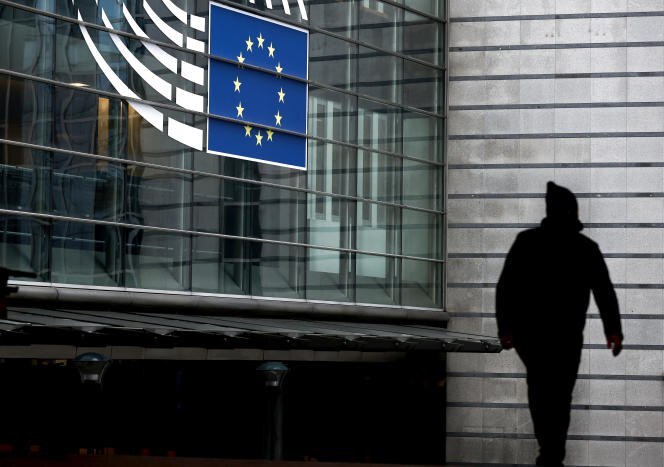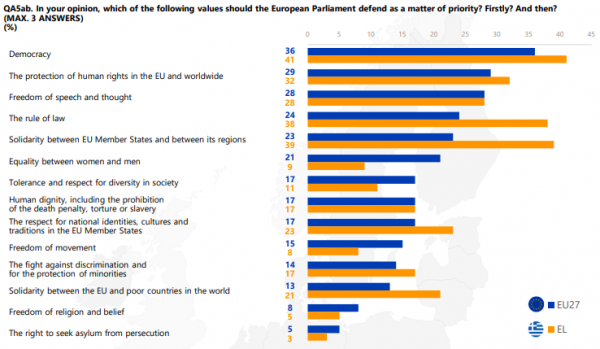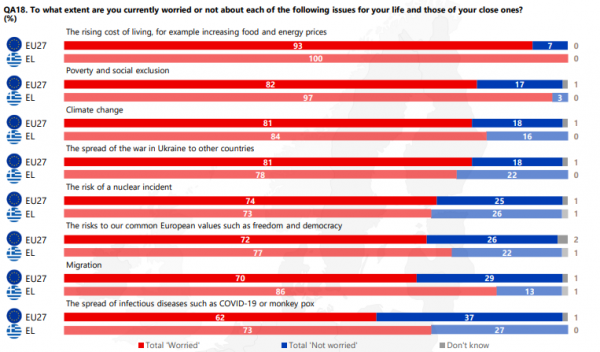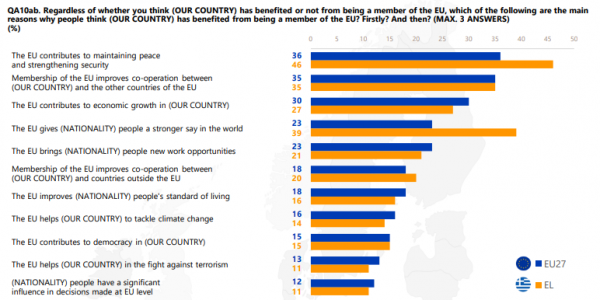
The rising cost of living is the biggest concern of Europeans according to the latest Eurobarometer, which covers autumn 2022. And, as high as 93% of the European average reported rising costs as the main concern, the anxiety of the Greeks exceeds that of any other country, but also of all previous ones, reaching a historic 100% – a percentage that has never before appeared in the results of a regular EU poll.
Other fears of Europeans reported in high percentages were the threat of poverty and social exclusion (97% in Greece, 82% at EU level), climate change and the spread of war in Ukraine (81% at EU level). For the Greek participants, rather expectedly, migration was in the third place of concern (86%), while climate change took the fourth place with 84%.

Financial difficulties and unpaid bills
Greeks appear more dissatisfied, more anxious and with views that deviate more often from the European “norm” in almost all the fields examined by the Eurobarometer. A significant part of this pessimism may be explained by the answers given by the participants from Greece to the question concerning their financial situation.
In this, just 20% said they were generally comfortable with their income (a meagre 1% said they were “very comfortable”), while 51% said they were experiencing “some difficulty” and 28% were experiencing ” many difficulties”. In comparison, 46% of all Europeans reported that they are relatively financially comfortable and 8% very comfortable, while only 9% that they face great financial difficulties.
Accordingly, 85% of Greeks said they struggle to pay their bills at least “some of the time” (with 35% struggling “most of the time”) compared to 39% of the European average, of which only 9 % struggles to meet fixed expenses “most of the time”. In fact, Greeks’ ability to cope with the cost of living seems to be linked to their view of the EU, as those facing the biggest problems also have the worst image of the bloc.
Similar discrepancies are recorded in the extent to which Greeks state that they were financially affected by the successive crises (geopolitical, health, cost of living) of recent years in relation to the European average. Specifically, 66% reported that they have already seen their living conditions deteriorate and 29% that they expect to see them deteriorate within the year, compared to 46% and 39% respectively for all participants from across Europe .
Therefore, it is perhaps not surprising that Greeks are among the most dissatisfied Europeans when it comes to dealing with rising prices both at national level (79% compared to 64% of the European average) and at EU level (77 % compared to 56% of the European average).
Opponents of the EU’s stance towards Ukraine
Notable discrepancies are also noted in the opinion of the Greeks about the EU’s attitude towards the war in Ukraine and its consequences, compared to the majority of Europeans. Specifically, when 74% of Europeans fully or generally approve of the EU’s support for Ukraine, for Greeks the percentage shrinks to 48%, while when the question is specific to the specific moves made by the bloc for this purpose (imposition of sanctions, economic, military and humanitarian support), Greeks have the most negative view of the 27, with just 46% saying they support them (compared to the 73% average).
Values and priorities
When asked to choose the values that the EU should defend as a priority, Europeans chose democracy (36), the protection of human rights in the EU and the world (29), freedom of speech and thought (28%) and the rule of law (24%). And in this case, the Greek deviations are interesting: the Greeks chose democracy in first place (41%), solidarity between EU member states in second place (39%), the rule of law (38%) and then the protection of human rights (32%).

As for the issues that should be tackled as a priority, European citizens first mentioned tackling poverty and social exclusion (37%), public health (34%) and climate change (31%), while the Greeks
months once again gave special importance to the support of the economy and the creation of new jobs (55%), bringing it to second place. (The first priority was tackling poverty with 58%, the third was strengthening public health with 44% and the fourth was protecting democracy and the rule of law with 33%).
Ambivalence towards the EU
Almost a decade and a half of crises have left Greeks with ambivalent feelings towards the EU. Thus, less than a third of the participants have a positive view of the European Parliament (27%), while slightly more are those who have a good image of the EU in general (34 %). Given that Greeks also state in significantly smaller percentages that they consider their country’s participation in the EU to be positive (43% compared to 62% of the European average) it is surprising that they would like to see the role of the European Parliament strengthened in increased percentages compared to all Europeans (75% and 55% respectively).
As for what the Greeks consider to be the advantages that the EU offers to their country: Ensuring peace and security comes first with 46%, followed by strengthening Greece’s international importance with 39%, then improving cooperation with other EU member states (35%) and economic development (27%) . On the contrary, in the negatives of Greece’s participation in the bloc, the respondents mentioned first the limited influence that Greeks have in their view on the decisions made at the European level and their belief that the issues of greatest importance to Greece are better off dealt with at the national level (41% in both cases), the limited influence of the Greek government on decisions taken at the EU level (40%) and the opinion that the Greek economy would do better if Greece did not belong to the Union (26 %).

Democracy and European elections
Greeks also express higher levels of dissatisfaction with the state of democracy in the bloc, as only 35% say they are satisfied, compared to 54% of the European average. However, correspondingly small percentages of satisfaction are also reported when they are asked about the state of democracy at the national level (34% compared to 56% of the European average).
At the same time, the answers of the Greeks regarding the European Elections of 2024 are of particular interest. Specifically, although they express great interest in the process (56%, i.e. increased by 14% compared to the corresponding period in 2017) and state that they would vote if the elections were scheduled for next week in one of the highest percentages recorded among the 27 (75% compared to the average of 67%), only 15% know when the next European elections will be held, while the reasons which they say will lead them to the polls differ radically from the motivations reported by the average European.
Specifically, while on average EU citizens state as their main motivations their duty as citizens (37%), the fact that they are used to participating in electoral processes (34%) and then their desire to support a political party ( 34%) and encourage change (29%), Greeks put first their desire to support a political party (55%) or a specific candidate (39%) and then their desire to encourage change (37%) and to do their duty as citizens (36%).
The European Parliament’s autumn 2022 Eurobarometer was conducted between 12 October and 7 November 2022 in the 27 EU Member States. A total of 26,431 Europeans took part in the survey and the EU-wide results were weighted according to the size of each country’s population. In Greece, 1009 people participated through a personal interview.
Latest News

WTTC: Travel & Tourism to Create 4.5M New Jobs in EU by 2035
This year, international visitor spending is set to reach 573 billion euros, up by more than 11% year-on-year

IMF: US Tariffs Shake Global Economy, Outlook Downbeat
IMF slashes global growth forecast to 2.8% as U.S. tariffs create uncertainty and ‘negative supply shock

First Step Towards New Audiovisual Industry Hub in Drama
The project is set to contribute to the further development of Greece’s film industry and establish Drama as an audiovisual hub in the region

Airbnb Greece – Initial CoS Ruling Deems Tax Circular Unlawful
The case reached the Council of State following annulment applications filed by the Panhellenic Federation of Property Owners (POMIDA)

Mitsotakis Unveils €1 Billion Plan for Housing, Pensioners, Public investments
Greek Prime Minister Kyriakos Mitsotakis has announced a new set of economic support measures, worth 1 billion euros, aiming to provide financial relief to citizens.

Alter Ego Ventures Invests in Pioneering Gaming Company ‘Couch Heroes’
Alter Ego Ventures' participation in the share capital of Couch Heroes marks yet another investment by the Alter Ego Media Group in innovative companies with a focus on technology.

Corruption Still Plagues Greece’s Driving Tests
While traffic accidents continue to claim lives on Greek roads daily, irregularities and under-the-table dealings in the training and testing of new drivers remain disturbingly widespread

Pope Francis Died of Stroke and Heart Failure Vatican Confirms
As news of the official cause of death spread, tributes poured in from across the globe. The 1.4 billion-member Catholic Church is united in grief, remembering a pope who championed inclusion, justice, and compassion

Increase in Both Museum Visits, Revenues for 2024
As expected, the Acropolis was the top archeological site in the country, followed by Sounion, Mycenae, the ancient theater of Epidaurus, and Vergina in northern Greece

Where Greece’s Tourists Come From: A Look at 2025’s Top Visitor Markets
The United Kingdom continues to hold the top spot as the largest source of incoming tourism, with 5.6 million seats booked for Greece this summer — up 2.2% from last year. This accounts for 20% of all international air traffic to Greece














![Πλημμύρες: Σημειώθηκαν σε επίπεδα ρεκόρ στην Ευρώπη το 2024 [γράφημα]](https://www.ot.gr/wp-content/uploads/2025/04/FLOOD_HUNGRY-90x90.jpg)



![Ξενοδοχεία: Μεγάλο το ενδιαφέρον για επενδύσεις στην Ελλάδα – Η θέση της Αθήνας [γραφήματα]](https://www.ot.gr/wp-content/uploads/2025/03/Athens-hotels-90x90.jpg)
























 Αριθμός Πιστοποίησης
Αριθμός Πιστοποίησης